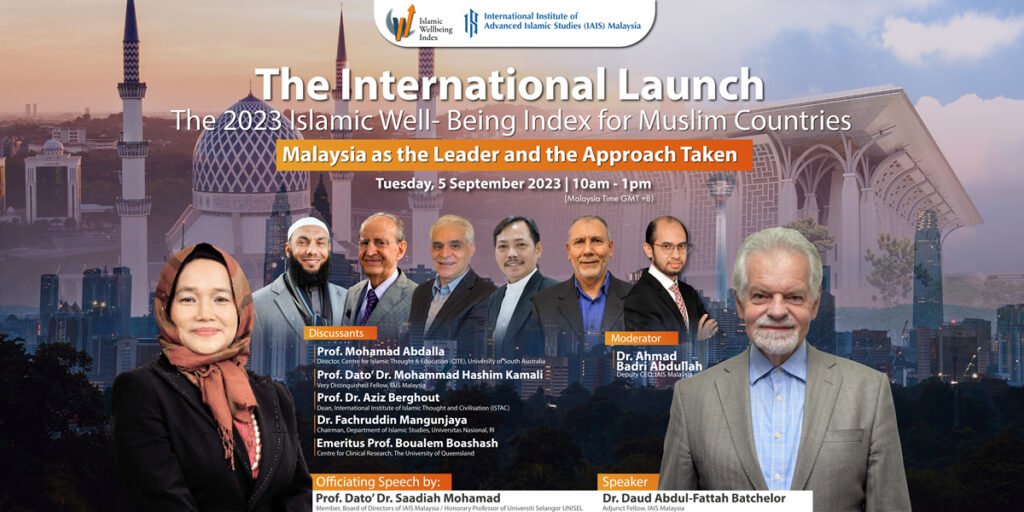Results are now available from the number-crunching of indicator values for the 2023 Islamic Well-Being Index of Muslim Countries (Table 1). The Index was developed by Dr Daud Batchelor, while the International Institute of Advanced Islamic Studies (IAIS) Malaysia is its institutional platform. Malaysia has regained the leadership position it held when the Index was first published in 2013. It means that a majority of Malaysian Muslims are experiencing relative well-being compared to other Muslim countries, as a consequence of government policies and themselves having inculcated to varying degrees, Islamic teachings and practices. The Index is largely reflecting conditions in a post-Covid pandemic world.
Follow-up countries in ranking within the 33 countries having data on religiosity (Din) available, were Maldives (2nd), Jordan (3rd), Indonesia (4th) and Tunisa (5th). Jordan’s improved position coincides with its government deliberately pursuing policies intended to achieve citizens’ well-being. The Jordan Prosperity Index was designed by the Jordan Strategy Forum (JSF) in 2016 to achieve both ‘Utilitarian’ and ‘Evaluative’ Well-Being in three domains: Inclusive society, Growth and investment, and Empowered people.[1] This program also seems to be improving Jordan’s ‘Islamic Well-Being.’ Jordan may be considering following a number of developed countries – New Zealand, Scotland, Finland, Iceland, Wales (Well-Being Economy Governments; WEGO) – that incorporate sustainable well-being objectives in their national development policies.
The massive improvement in Kosovo’s Islamic well-being ranking (+18) reported in 2022, seems to be reflected (even possibly influenced) this year in welcome IWI improved rankings (potentially, a long-awaited post-communism Islamic revival) in neighbouring European Muslim countries – Bosnia and Herzegovina (+12) and Albania (+8).
Countries whose rankings fell most precipitously since IWI 2022 were Kyrgyzstan (-11) and Kazakhstan, Burkina Faso and Mali (-6) followed by Niger (-5). In the Central Asian countries this was related to political destabilization and border disputes erupting without Russia’s mediating influence as it is preoccupied with the Ukraine war. Correspondent Pepe Escobar, believes “Central Asia is the prime battlefield in the New Great Game” and could likely suffer political confrontation between Russia and China on the one hand and the US and EU on the other.[2] Certain West African countries (Niger, Burkina Faso, Mali) are affected by instability related to France and its departure as the former colonial power, and an apparent desire for a more independent and Islamic ethos in their countries’ governance (assuming it will lead to democratic governments).
The methodology of the 2023 Index is based on the Higher Objectives of Islamic Law (Maqasid al-Shari’ah) and follows closely the approach detailed in the author’s 2021 article “An Enhanced Islamic Well-Being Index (IWI 2.0-2021) for Muslim Countries,” published in Volume 12(2) of the Islam and Civilisational Renewal journal. It is based largely on using the five essential (daruriyyat) elements of Maqasid al-Shari‘ah, as developed by classical scholars, Imams Abu Hamid Ghazali (d.1111) and Abu-Ishaq al-Shatibi (d.1388). This is an enhanced version of that detailed in the author’s original article, “A New Islamic Rating Index of Well-Being for Muslim Countries,” published in 2013. It is intended that the Index will ideally be determined routinely around mid-year when most of the annually-updated source data becomes available. The dedicated support of members of the Board of Advisors for the IWI Index, Professor Dato’ Dr Mohammad Hashim Kamali (IAIS) and Professor Dr Abdelaziz Berghout, Dean, International Institute of Islamic Thought and Civilisation (ISTAC), is highly appreciated.
In acknowledging the merits of some of the scholarly feedback from last year’s Launch and in an effort to continually improve efficacy of the Index, two changes were incorporated in the 2023 IWI computation. Firstly, weightings were changed for achieving composite values by reducing the Religion (Din) weighting from twice to 1.5, while the Life weighting was increased from one to 1.5. This latter change resulted in improvements in the rankings of the Gulf Arab countries and Brunei in the Non-Din Maqasid results. These countries are not however, represented in the overall IWI Index, since we do not have Islamicity data for them. The other change was to include a Research and Development component as a percentage of national GDP as an additional indicator for the Intellect Objective.
Benefits of the Index are that it offers a scorecard that highlights leader and laggard countries and provides practical insights for countries that aspire to move to a higher state. The IWI indicators provide a way to spot problems, set targets, track trends, understand outcomes and identify best policy practices, especially for government officials to facilitate communications with key stakeholders for change. Relevant stakeholders can use the index as a tool in identifying what specific actions can contribute to greater levels of Islamic well-being.
51 Muslim majority countries could be assessed for the four Maqasid fields of Life (Nafs), Intellect (Aql), Family (Nasl/Nasb) and Wealth (Maal). Eritrea was included this year as evidence indicates Muslims there are now a majority. Based on the composite average value for these Non-Din Maqasid (Table 2), the following countries excelled: Malaysia (1st), UAE (2nd), Kosovo (3rd), Maldives (4th), and Jordan (5th). Significant improvements were shown by Qatar and Saudi Arabia (+19), Bangladesh (+14), Oman (+11), and Brunei, Jordan and Kuwait (+9). Kazakhstan however, declined very precipitously, dropping from the first position in 2022 to 22nd today. This is undoubtedly due to the major upheaval the country experienced in January 2022, starting with pubic protests over increasing food prices, which led to the leader calling in help from Russian forces and heavy military action resulting in the death of over 238 people. Officially it was called a coup attempt but it clearly resulted in a major loss of the government’s social capital. Rankings of other Central Asian Muslim countries also deteriorated.
Leaders in the Protection of Din (Religion) Objective are Guinea-Bissau (1st), Nigeria (2nd), Burkina Faso (3rd), Chad (4th) and Djibouti (5th), all African countries.
Leaders in the Protection of Life (Nafs) Objective are UAE (1st), Albania (2nd), Kuwait (3rd), Kosovo (4th), and Jordan (5th). Those that improved the most were Senegal (+13), Saudi Arabia and Oman (+8), Guinea and Guinea-Bissau (+5), while Kyrgyzstan and Djibouti (-5), and Comoros, Iran, Kazakhstan, and Niger (-4) declined the most.
Leaders in the Protection of Intellect (‘Aql) Objective are Malaysia (1st), Maldives (2nd), UAE (3rd), Kosovo (4th), and Qatar (5th). Those that improved most were Lebanon (+15) and Iran (+14), Morocco (+13), Egypt (+11) and Libya and Palestine (+10), while Kyrgyzstan (-26), Uzbekistan (-18), Kazakhstan (-15), Albania and Bosnia & Herzegovina (-14) and Syria (-11) declined the most. Including research and development levels as an indicator helped the ranking position of the leaders in this field, UAE, Turkey and Malaysia.
Leaders in the Protection of Family (Nasb/Naql) Objective are Bangladesh (1st), Syria (2nd), Palestine (3rd), Libya (4th), and Iran (5th), mostly countries experiencing insecurity. Those that improved most were Mauritania (+19), Oman (+16), Jordan (+15), Palestine and Saudi Arabia (+12), while Tunisia (-18), Morocco (-15), Niger (-14), Kazakhstan (-13), Lebanon (-11) and Pakistan (-10) declined the most.
Leaders in the Protection of Wealth (Maal) Objective are Malaysia (1st), UAE (2nd), Indonesia (3rd), Saudi Arabia (4th) and Bahrain (5th). Those that improved most were Saudi Arabia (+28), Kuwait (+27), Bangladesh (+25), and Brunei and Qatar (+23), while Azerbaijan (-40), Palestine (-38), Burkina Faso and Kazakhstan (-27), Niger and Sierra Leone (-23) and Senegal (-22) declined the most. Palestine’s position dropped precipitously as a correction from last year’s artificially high ranking, resulting from the incorporation of their high 2023 unemployment figure in this year’s computation.
Comparing Muslim country averages for the chosen vital IWI indicators with World Average Values (Table 3), shows unfortunately, that Muslim countries often fare worse than the World averages, except in the religiosity fields (i.e. “Attend place of worship weekly;” “Pray daily;” “Consider religion is ‘very important’”) and National homicide rates, maternal and infant mortality rates, Gini coefficient, and Islamic financial development, where they perform better. Incorporating the R&D indicator for the first time was timely in exhibiting the extreme deficiency of spending by Muslim countries in this field to the detriment of the Ummah’s future. The Muslim countries’ average spend as a proportion of GDP is only one-sixth of the World Average. The Muslim World surely must prioritise enhancing such spending in their national budgets.
Dr Daud Batchelor
Adjunct Fellow, IAIS Malaysia
September 5, 2023
** The above mentioned Tables can be accessed from the Indices Menu.
[1] Jordan Strategy Forum, “Jordan Prosperity Index 2023,” June 2023. https://www.jsf.org/uploads/2023/06/19/Prosperity%202023-1687170988.pdf (Accessed September 3, 2023)
[2] Pepe Escobar, “Central Asia is the prime battlefield in the New Great Game,” Information Clearing House, August 18/19, 2023. https://www.informationclearinghouse.info/57749.htm (Accessed September 3, 2023)

